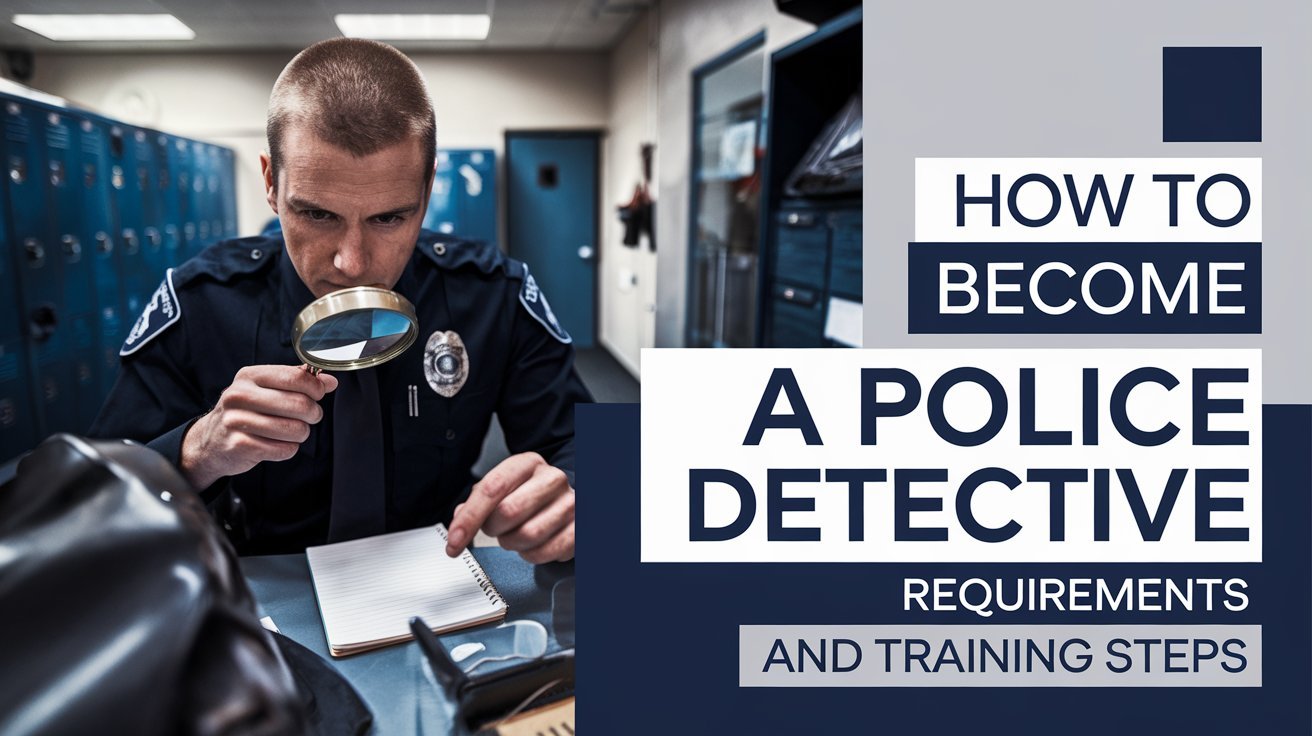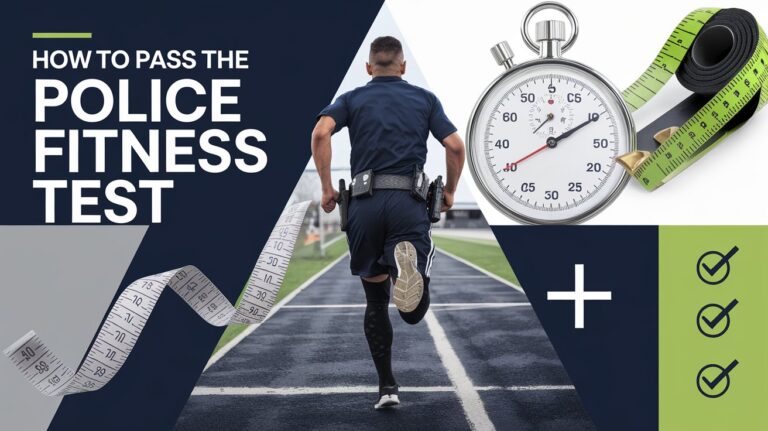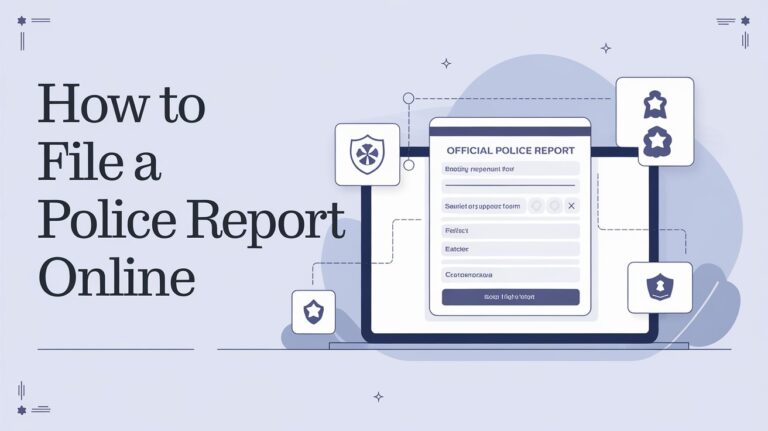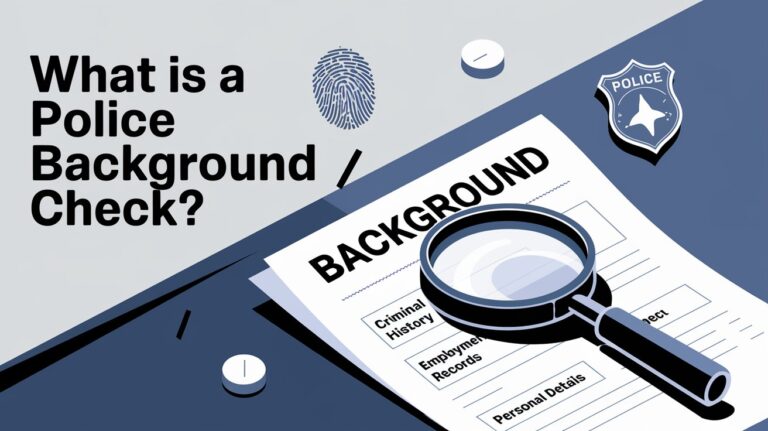How to Become a Police Detective: Requirements and Training Steps

Becoming a police detective is a rewarding career. It combines investigative skills, analytical thinking, and a dedication to public service. Detectives play a key role in solving crimes and bringing criminals to justice.
The journey to becoming a detective starts with gaining experience as a police officer. Then, you move into specialized detective work.
This guide will cover the educational requirements, training, and career progression steps. It’s for those who want to become a police detective. Whether you’re new to law enforcement or an experienced officer looking for a new challenge, this article will help you.
Police Detective Role and Career Overview
Police detectives are key in solving crimes and keeping communities safe. They do many things, like looking at evidence and talking to witnesses. They also work with other police to solve big cases.
These detectives are the ones who find the truth and make sure justice is done. They use their skills to catch the bad guys.
Core Responsibilities
At the core of a detective’s job is finding and analyzing clues, questioning suspects, and talking to witnesses. They need to be good at solving puzzles and paying attention to details. They work in different areas, like murder, drugs, or fraud, each needing its own skills.
Career Impact and Public Service
The work of detectives has a huge impact. They solve crimes and make sure the bad guys are caught. This helps keep everyone safe and makes the community better.
They work hard to find the truth. This helps keep the law strong and makes sure justice is done.
Types of Detective Positions
Police detectives can specialize in many areas, including:
- Homicide investigations
- Narcotics and drug-related crimes
- Fraud and financial crimes
- Sexual assault and crimes against vulnerable populations
- Organized crime and racketeering
- Cybercrime and technology-related offenses
Each area needs special training and knowledge. This helps detectives solve big cases that affect everyone.
| Detective Duties | Criminal Investigations | Public Safety | Specialized Detective Roles |
|---|---|---|---|
| Gathering and analyzing evidence | Interrogating suspects | Solving complex crimes | Homicide, Narcotics, Fraud, Special Victims |
| Interviewing witnesses | Collaborating with law enforcement agencies | Upholding the rule of law | Organized Crime, Cybercrime |
| Critical thinking and problem-solving | Utilizing specialized investigative techniques | Ensuring justice is served | Financial Crimes, Technology-related Offenses |
Educational Requirements for Aspiring Detectives
To become a police detective, you need a strong educational base. A high school diploma or GED is usually the starting point. But, many places prefer or require a college degree in criminal justice, criminology, or forensic science.
These fields give future detectives the knowledge and skills they need. They help them do well in their jobs.
Some police forces offer bonuses or need officers to get more education as they move up. This focus on detective education and law enforcement training prepares detectives to solve tough cases. They learn to think critically, investigate, and analyze.
Getting a degree and gaining practical experience are key for detectives. Departments often look for candidates with a criminal justice degree or experience in the field. These people know the law and how to investigate.
“Education is the foundation upon which we build our future.” – Christine Gregoire
While a high school diploma or GED is the basic need, a college degree in a related field is highly advised. Also, ongoing learning is crucial for a career as a police detective. This dedication to detective education and law enforcement training boosts your chances of success in this demanding field.
How to Become a Police Detective?
Becoming a police detective is a fulfilling career that allows you to use investigative skills to serve your community. It requires obtaining qualifications, completing training, and gaining experience.
Essential Qualifications
To be a detective, you need certain skills. These include analytical thinking, attention to detail, and good communication. Most police agencies in the U.S. require a high school diploma or GED. Some may also want a college degree, like criminal justice.
Training Requirements
First, you must go through police academy training. This training lasts 12-14 weeks and covers many topics. After graduating, you need to work as a patrol officer for 3-5 years before applying for detective roles.
Career Progression Path
To become a detective, you’ll move up through the ranks. You’ll need to show your skills and leadership. Being a detective can lead to specializing in areas like homicide or narcotics.
Throughout your career, keep learning and growing. Detectives must stay current with new techniques, laws, and technology. This ensures they can handle today’s law enforcement challenges.
Police Academy Training Fundamentals
Aspiring police detectives must first complete rigorous training at a police academy. This comprehensive curriculum lays the essential groundwork for a career in law enforcement. The police academy curriculum typically spans 13 to 24 weeks. It provides recruits with a robust education in physical fitness, firearms handling, criminal law, defensive tactics, and emergency response procedures.
Upon graduation, recruits must pass a certification exam to become sworn police officers. This law enforcement training equips them with the knowledge and skills necessary for future detective work. The police certification process ensures that aspiring detectives meet the high standards set by the criminal justice system.
- The full-time Basic Police Academy course is 904 hours long, typically lasting around six months.
- Applicants must pass the POST Reading/Writing Test and Physical Agility Exam to be selected for the program.
- The curriculum covers a wide range of topics, including Criminal Law, Patrol Procedures, Defensive Tactics, Firearms, Leadership, and Ethics.
- Comprehensive background checks and character assessments are conducted to ensure the suitability of candidates.
Completing the rigorous police academy training, recruits gain the essential knowledge, skills, and certification required to embark on a rewarding career as a police detective. This foundational education lays the groundwork for their future investigative work and service to the community.
Criminal Investigation Techniques and Methods
Detectives play a vital role in solving crimes. They use many techniques and methods. This includes collecting forensic evidence, conducting witness interviews, and analyzing crime scenes. Their hard work helps uncover the truth and catch criminals.
Evidence Collection Protocols
Collecting and keeping evidence is crucial. Detectives follow strict rules to protect forensic evidence. This includes fingerprints, DNA, weapons, and digital devices. They must document, package, and track evidence to make it admissible in court.
Interview Strategies
Good witness interviews are essential. Detectives use different methods to get accurate information. They listen well, ask open questions, and build trust. This helps them understand what happened and find important clues.
Crime Scene Documentation
Thorough crime scene analysis is vital. Detectives take detailed notes, photos, and sketches. They document everything, like where evidence is and how things were arranged. This helps them and the courts later on.
| Investigative Technique | Key Considerations |
|---|---|
| Evidence Collection | Handling, packaging, and chain of custody |
| Witness Interviews | Rapport building, open-ended questioning, and active listening |
| Crime Scene Documentation | Detailed note-taking, photography, and sketching |
Detectives use these techniques to solve crimes. They collect evidence, interview witnesses, and analyze scenes. This work helps them solve cases and bring justice to victims.
Specialization Areas in Detective Work
Police detectives often choose to specialize in certain areas of crime investigation as they gain experience. These specializations need unique skills, knowledge, and training. Here are some common areas for homicide detectives, narcotics investigators, fraud detectives, and special victims unit personnel.
Homicide Detectives
Homicide detectives investigate suspicious deaths, like murders and manslaughter. They collect evidence, interview witnesses, and build cases. Skills like attention to detail and critical thinking are crucial.
Narcotics Investigators
Narcotics investigators deal with drug-related crimes. They work with informants, conduct surveillance, and execute search warrants. Their goal is to disrupt drug trafficking networks.
Fraud Detectives
Fraud detectives focus on financial crimes like embezzlement and identity theft. They analyze financial records and work with forensic accountants. Their aim is to build cases against white-collar criminals.
Special Victims Unit
The special victims unit (SVU) investigates sex crimes and domestic violence. SVU detectives get special training in interviewing techniques. They work with social services to support victims.
All police detectives need strong investigative skills and a commitment to justice. This is true for any specialization.
Physical and Mental Requirements
Those wanting to be police detectives must meet tough physical and mental standards. They need to be in top shape for the job’s demands. This includes chasing suspects, securing crime scenes, and doing physical investigations.
Fitness Standards
Police departments check candidates’ physical fitness through tests. They look at strength, endurance, and agility. These tests might include running, obstacle courses, and learning defensive tactics.
They also check vision and medical health. This ensures candidates are fit for the job.
Psychological Evaluations
Police detectives also need to show they can handle mental stress. They go through tough psychological tests. These tests check their decision-making, stress management, and emotional stability.
It’s important for detectives to keep their physical and mental health up. Regular exercise and mental health support are key. They help detectives do their job well and keep communities safe.
Professional Certifications and Advancement
In law enforcement, getting professional certifications can really boost a detective’s career. These certifications show a detective’s skills and commitment. They open up new chances for growth and advancement.
There are many certifications to choose from, like those in forensics, cybercrime, or leadership. These show a detective’s deep knowledge and their drive to keep learning and growing.
Advancing in a detective’s career requires experience, strong performance, and additional qualifications. Those who do well can move up to roles like detective sergeant or lieutenant. They get to lead teams and help make big decisions.
Getting the right law enforcement certifications is key for career growth. They prove a detective’s skills, dedication, and readiness for bigger roles. This can help them get promoted and move up in their career.
| Certification | Description | Requirements |
|---|---|---|
| Certified Fraud Examiner (CFE) | Globally preferred by employers, this certification indicates expertise in fraud prevention, detection, deterrence, and investigation. | More than two years of work experience and a renewal every 3 years. |
| Certified Criminal Investigator | Provides a foundation of forensics basics and aims to standardize knowledge and competency for investigators in both public and private sectors. | More than two years of education or training after high school and work experience. |
| OSHA Safety Certificate | Demonstrates expertise in occupational safety, a critical skill for detectives responsible for managing crime scenes and evidence collection. | More than two years of education or training after high school and work experience. |
The most common detective certifications include the Certified Fraud Examiner, Certified Criminal Investigator, and OSHA Safety Certificate. They show the value of a broad range of certifications for moving up in law enforcement certifications, detective promotion, and career development.
Detective Salary Structure and Benefits
The pay for police detectives changes based on where they work, how long they’ve been doing it, and what they specialize in. The Bureau of Labor Statistics says detectives and criminal investigators make about $91,100 a year on average in the U.S. as of May 2023.
Regional Pay Variations
Detective salaries vary by region and the size of the department. New detectives can make between $40,000 to $60,000 a year. Experienced ones in big cities or special units might earn $70,000 to $100,000 or more. Those working for the FBI, for example, can make about $96,680 a year.
Career Growth Potential
There’s a lot of room to grow and earn more as a detective. Those who focus on serious crimes or cybercrime can make more because of their skills. Plus, there’s overtime pay and bonuses for big cases, which can increase their yearly income.
| Detective Position | Average Salary |
|---|---|
| Entry-Level Detective | $40,000 – $60,000 |
| Experienced Detective | $70,000 – $100,000+ |
| Federal Government Detective (e.g., FBI) | $96,680 |
| Homicide Detective | Approximately $60,000 |
| Private Detective | $45,740 |
Police detectives also get great benefits like health insurance, retirement plans, and paid time off. These perks make their job even more rewarding and satisfying.
Technology and Tools in Modern Detective Work
In today’s world, technology is key in detective work. Forensic tech, digital evidence analysis, and crime-solving software have changed how crimes are solved. They help law enforcement catch criminals and bring them to justice.
Forensic science has made huge strides. DNA testing can now link suspects to crimes or clear the innocent. Biometrics like fingerprints and iris scans help identify people and solve cases.
AI and machine learning have also helped detectives. Predictive policing tools use past data to predict crimes. Facial recognition and virtual reality help recreate crime scenes.
Digital forensics is a big part of detective work now. It includes tools for computer, mobile, and network forensics. These tools help solve crimes like fraud and cybercrime.
These tech advancements have made detective work better. Investigations are now more efficient and accurate. As tech keeps improving, detectives must keep up to solve today’s crimes.
| Technology | Applications | Impact |
|---|---|---|
| DNA Testing | Linking suspects to crime scenes, exonerating the wrongly accused | Significantly improved accuracy and reliability of investigations |
| Biometrics (Fingerprinting, Iris Recognition) | Identification and investigation processes | Crucial role in establishing physiological identity and patterns |
| Facial Recognition Software | Fraud detection, detainment procedures, booking and release processes | Streamlined identification and tracking of suspects |
| Virtual Reality Crime Scene Reconstruction | Detailed analysis of crime scenes, training for forensic professionals | Improved understanding and investigation of complex cases |
| Digital Forensics Tools | Retrieving deleted data, analyzing internet behavior, solving financial crimes, cybercrime, and child exploitation cases | Crucial in obtaining and analyzing digital evidence for investigations |
“The advancements in forensic technology, digital evidence analysis, and crime-solving software have transformed the field of detective work, making investigations more efficient, accurate, and effective.”
Building Professional Networks and Partnerships
Successful detectives know how important it is to build strong professional networks. They work with other law enforcement, forensic experts, and community groups. This helps share resources, solve cases better, and improve community ties.
Joining criminal justice associations is a great way to grow your network. Groups like the American Correctional Association, ASIS International, and the National Criminal Justice Association are full of opportunities. They offer chances to network, learn about the industry, and develop your skills.
- Join LinkedIn groups like The Law Enforcement Network, The Corrections Connection, and Forensic Psychology. This lets you connect with others and keep up with trends.
- Go to conferences and events hosted by professional associations. These events help you meet new people and learn about the latest law enforcement collaboration and interdepartmental cooperation methods.
- Get involved in community policing projects. This helps you build relationships with local groups and can lead to solving problems together.
Having a strong professional network can really help your career in law enforcement. It can make you happier and more successful. So, take the time to build and keep these important connections.
Real-World Case Experience and Field Training
Becoming a skilled detective takes more than just book smarts. Real-world experience and field training are key to mastering the skills needed to solve crimes. Many start as police officers, gaining experience before moving to investigative roles.
Field training gives new detectives a chance to practice their skills in real scenarios. They learn from experienced detectives, gaining insight into the detective’s world. They learn about collecting evidence, interviewing witnesses, and writing reports.
Detectives face a wide range of cases, from murder to financial crimes. Field training helps them develop critical thinking, problem-solving, and communication skills. This mix of classroom learning and hands-on experience prepares them for the field’s challenges.
Most-Asked Questions
What are the core responsibilities of a police detective?
Police detectives solve complex crimes by analyzing evidence and interviewing people. They work in areas like homicide and fraud. Their work is key to keeping communities safe.
What are the educational requirements for becoming a police detective?
You need a high school diploma or GED to start. A degree in criminal justice is recommended. It helps you understand the job better.
What are the steps to become a police detective?
First, get your high school diploma or GED. Then, think about college. Next, go to police academy. After that, work as a police officer. Apply for detective jobs. You need to be good at solving puzzles and talking well.
What is covered in police academy training?
Police academy lasts 13-24 weeks. You learn about fitness, guns, and law. You also learn how to defend yourself and respond in emergencies. You must pass a test to become a police officer.
What are some common detective specializations?
Detectives often focus on crimes like murder, drugs, and fraud. Each area needs its own skills and knowledge.
What are the physical and mental requirements for detectives?
Detectives need to be fit and pass mental tests. They must be able to handle the job’s physical demands. They also need to be mentally strong to deal with stress.
How can detectives advance their careers?
Getting certified in areas like forensics can help. Advancement depends on your experience and skills. You can become a sergeant or leader in a special unit.
What is the typical salary range for police detectives?
The median salary for detectives is $91,100 a year, as of May 2023. They also get benefits like health insurance and retirement plans.
How do detectives utilize technology in their work?
Detectives use tools like forensic software and databases. They need to keep up with new tech to solve crimes in the digital world.
How do detectives build professional networks and partnerships?
Good detectives work with other agencies and experts. They build strong networks. This helps solve cases and improve community relations.






